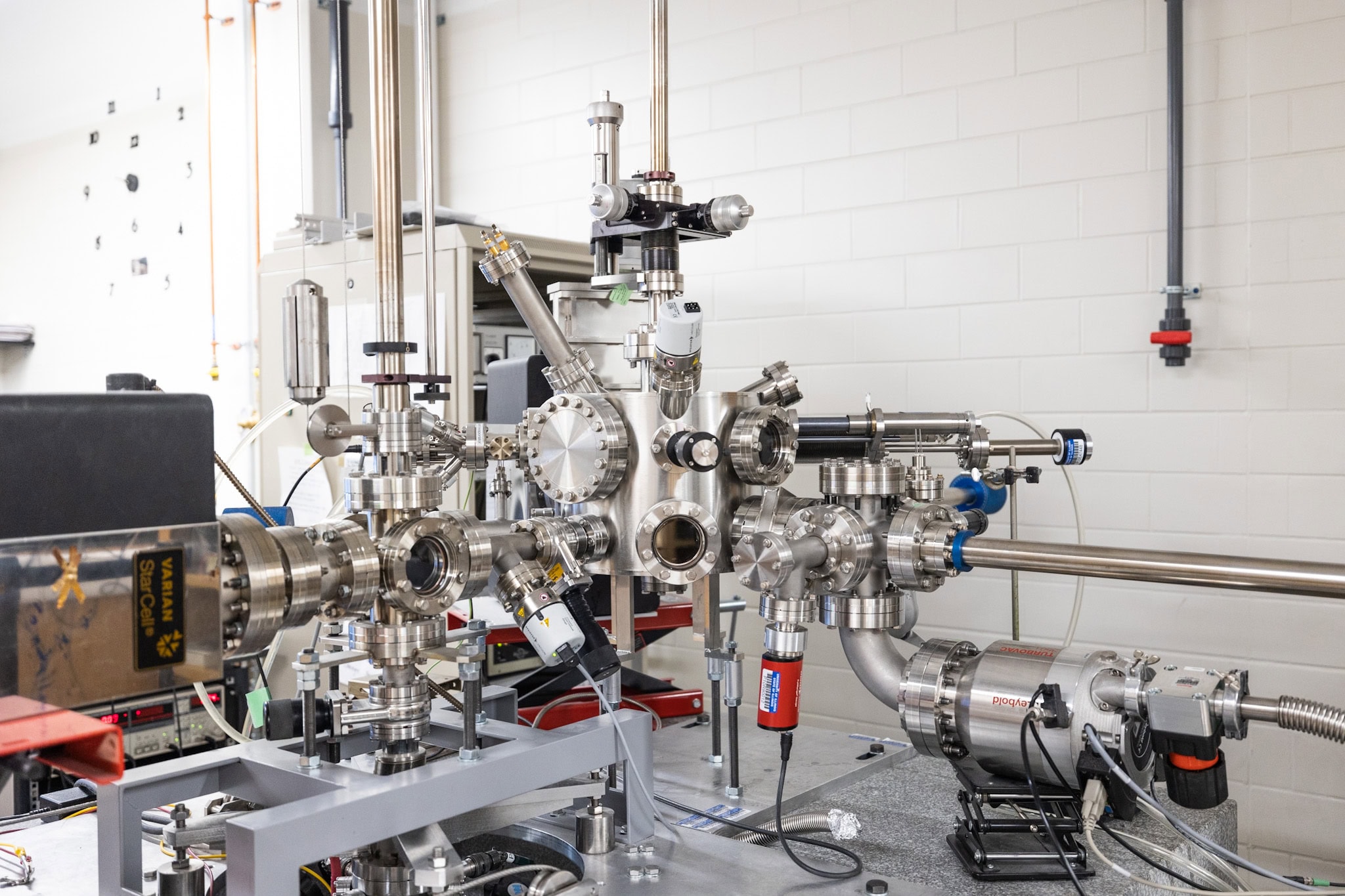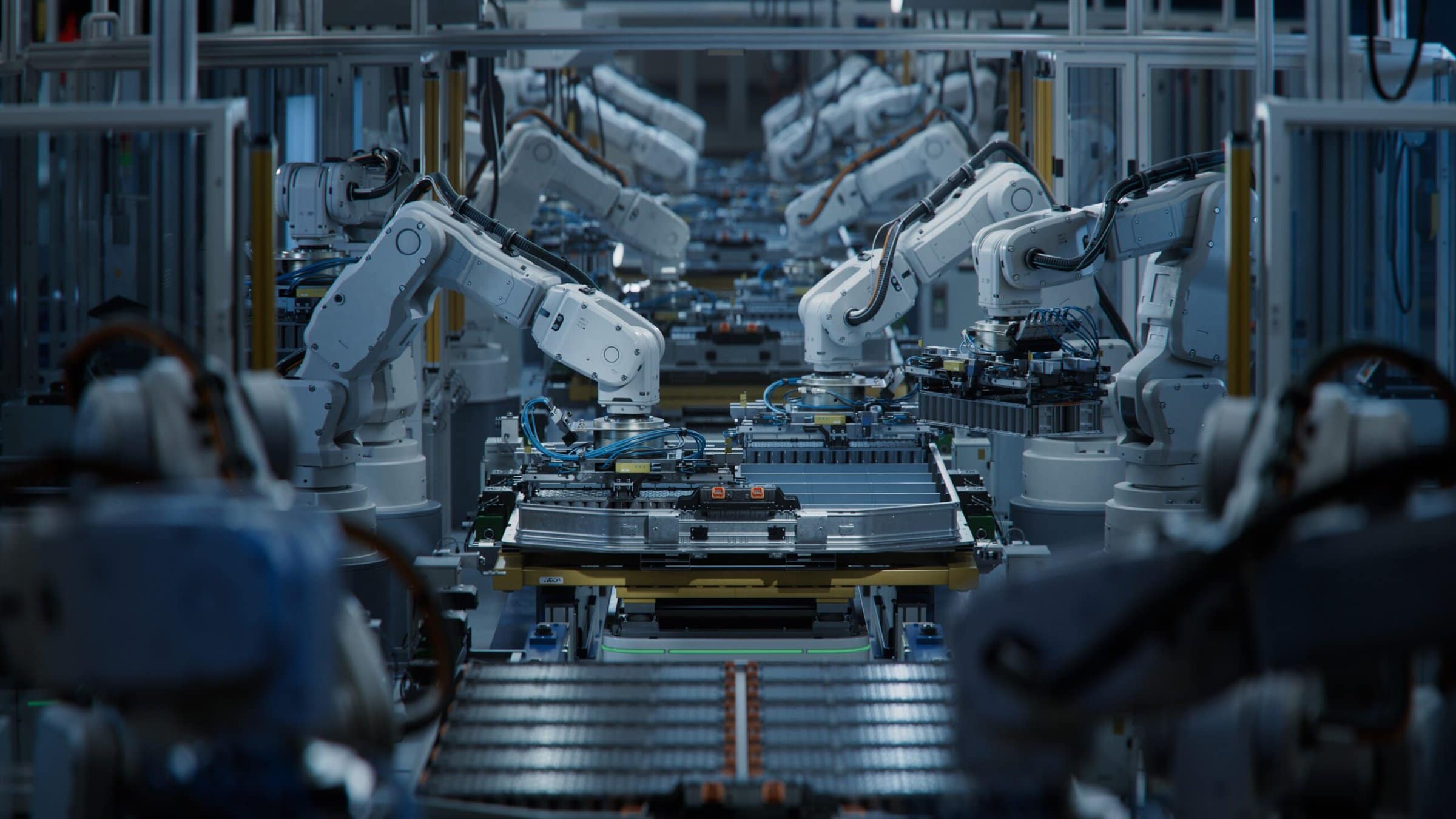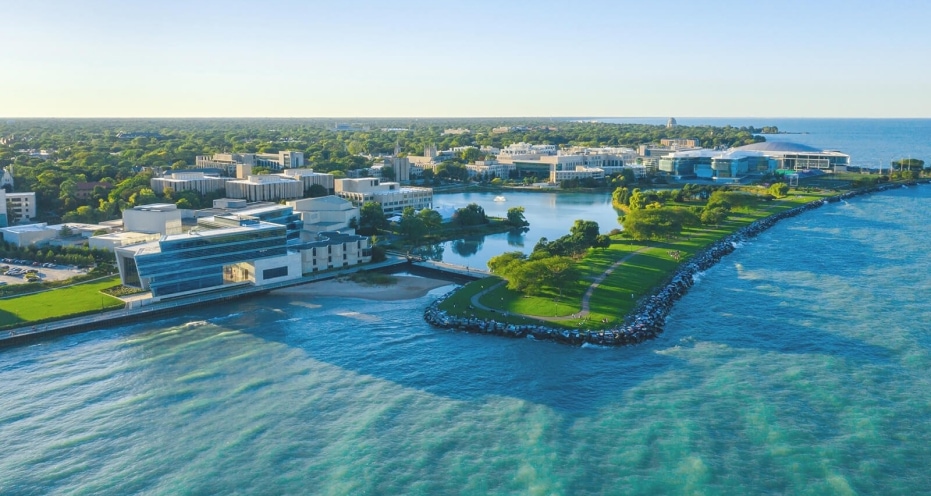Illinois Leads the Charge in Environmental Innovation: Highlights from Chicago Climate Tech Week 2024
Sophie Sturdevant / September 27, 2024
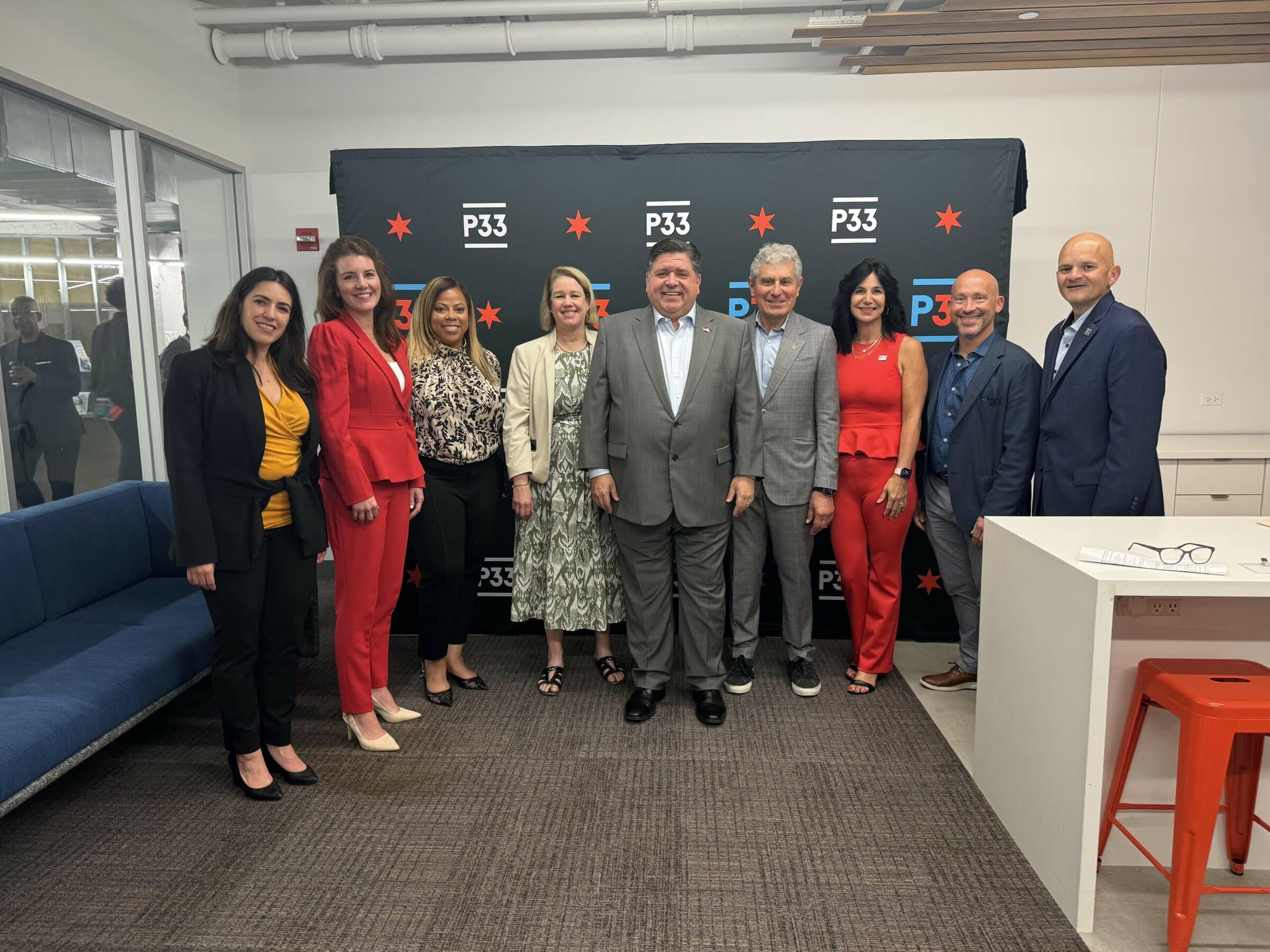
Intersect Illinois Interim CEO Paulina San Millan (far left), Illinois Governor JB Pritzker (center), and others at Chicago Climate Tech Week 2024.
Last week, Chicago was buzzing with energy at the second annual Climate Tech Week 2024, powered by TechChicago and its host, P33. The event, a crucible for climate technology discussions and networking, brought together industry leaders, policymakers, and entrepreneurs to drive meaningful action toward combating climate change.
Among the honorable speakers were Intersect Illinois’ Interim CEO and SVP of Business Development Paulina San Millan and Illinois Governor JB Pritzker, who alongside Invenergy CEO Michael Polsky in a sold-out and highly anticipated fireside chat moderated by Crain’s John Pletz, delved into the pivotal role Illinois plays in advancing critical climate technologies.
Paulina San Millan on the Impact of the Inflation Reduction Act
During a panel focused on the Inflation Reduction Act (IRA), Paulina highlighted how this landmark legislation is transforming the climate technology landscape in Illinois. She underscored the significant job growth in key sectors such as renewable energy generation and storage; with an 18% increase in related jobs from 2021-2022, Illinois is outpacing the Midwest in developing climate-focused solutions.
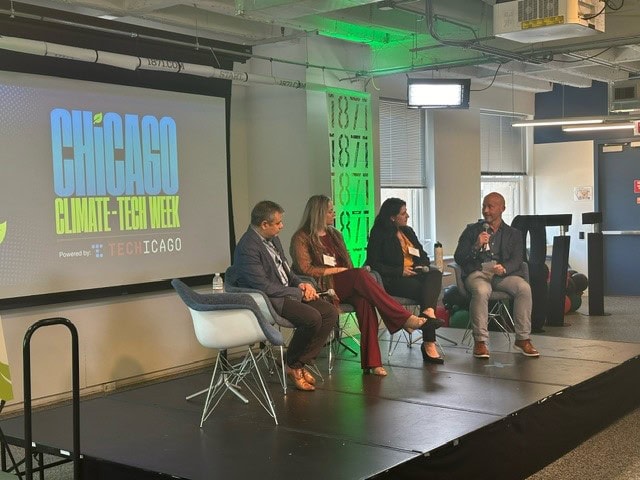
Paulina San Millan and other panelists, including Ted Hamer of KPMG, Karen Hensley-Chelstowska of Kraft Heinz, and Sujay Sharma of bp pulse Americas at Chicago Climate Tech Week 2024.
Panel Key Points
- Industry growth: Renewable energy and electric vehicle infrastructure have seen exponential growth, reflecting our strategic focus and the effectiveness of the IRA.
- State initiatives: Programs like Innovate Illinois and the Climate and Equitable Jobs Act (CEJA) are fostering an ecosystem that not only supports but accelerates the adoption of green technologies.
- Project pipeline: Of IRA-relevant projects since the legislation was passed, the average potential job creation of those projects is almost double that of non-IRA relevant projects.
Where the IRA and Opportunity Collide
Massive Green Investment
The IRA commits over $369 billion to clean energy and climate initiatives, spurring large-scale renewable energy projects and driving economic growth in green industries.
Workforce Development
The law encourages investment in workforce training programs, preparing workers for high-demand jobs in emerging energy sectors like solar, wind, and battery manufacturing.
Domestic Supply Chain Boost
By prioritizing American-made clean technologies and critical mineral production, the IRA aims to strengthen U.S. industrial competitiveness and reduce reliance on foreign supply chains.
Support for Underserved Communities
Targeted provisions in the IRA direct funding and resources to historically underserved and disadvantaged areas, promoting equitable economic development through green investments.
Tax Incentives for Businesses
Businesses benefit from extensive tax credits for clean energy production, manufacturing, and electric vehicle adoption, incentivizing innovation and job creation.
- Invest in Illinois Fund: $400 million closing fund for large projects with significant job creation and capital investments
- Reimaging Energy and Vehicles (REV): Includes up to 100% income tax withholding for new jobs created in the EV/clean energy manufacturing sectors
- Manufacturing Illinois Chips for Real Opportunity (MICRO): Incentives for manufacturers of microchips and semiconductor parts for job creation/retention and training cost benefits, plus credits for construction jobs and investment
- Economic Development for a Growing Economy (EDGE) Program: Tax credits equal to 50% of the new full-time employees’ payroll withholding and benefits for retained jobs
- Enterprise Zones (EZ) and High Impact Business (HIB): Benefits include building material sales and utility tax exemptions (natural gas and electricity), and investment tax credits
Governor Pritzker and Michael Polsky’s Fireside Chat
Shortly following the IRA panel, Governor Pritzker and Michael Polsky discussed critical issues facing the state’s energy future, particularly the need for enhanced electricity generation and a robust transmission system. Governor Pritzker emphasized “our number one goal” which is “to be a mass producer of energy, and it’s imperative that it’s climate-friendly.”
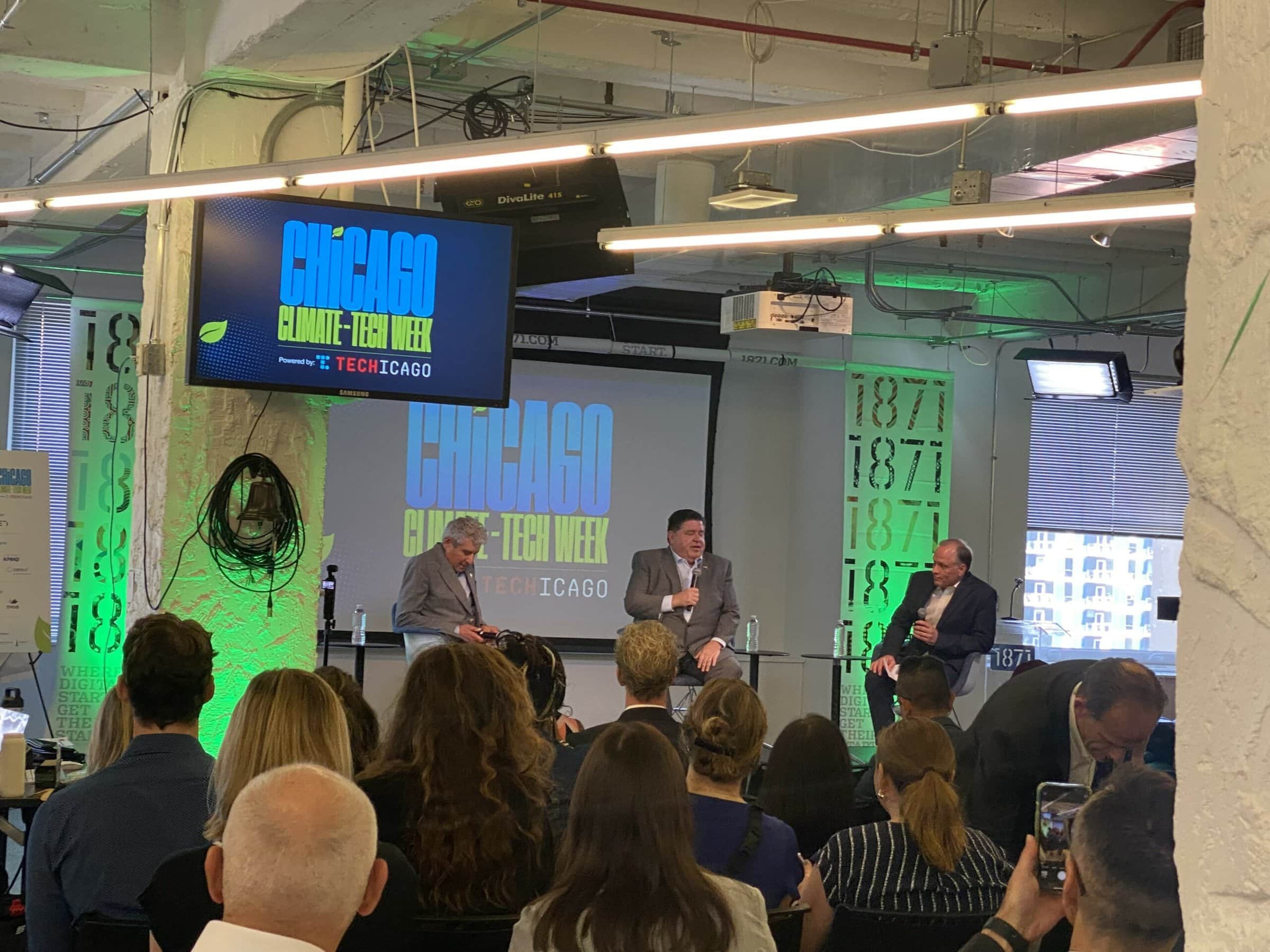
Invenergy CEO Michael Polsky, Governor Pritzker, and panel host John Pletz, senior reporter for Crain’s Chicago Business.
Fireside Chat Key Points
- Understanding our infrastructure: “We’ve come to the point where the old cow has no milk left. We have to build the infrastructure — our weakest link is transmission. If there’s no sun in Illinois, and no wind in Illinois, we have to have large geographical connectivity. We have to improve our transmission, and if we don’t, we’ll see problems with reliability. We have to have grid, and grid is infrastructure. Once we have transmission, we can carbonize properly,” said Polsky.
- Energy storage opportunities: “Energy storage is critical. We want to solve problems in the most economical, reliable, and technologically appropriate way. We can today capitalize on what was not possible just 10 years ago, especially in renewables,” said Pritzker. “We have lots of new energy coming online — nuclear, solar, and wind, too.”
Key Takeaways on Illinois for Climate Tech Business
Strategic Advantages
“There are two big things in the new five-year economic growth plan,” explained Pritzker. “We talk about the natural and the man-made advantages of Illinois. Naturally, we have the lake and lots of access to freshwater (in fact, Illinois boasts 20% of the world’s surface freshwater). On the man-made side, we have nuclear power plants that provide more than 50% of our power needs today (and that’s a huge advantage). Now, when we look at the need for climate action, we have something that isn’t fossil-fuel based energy.”
Supportive Policies
The state’s aggressive programs for renewable energy development and electric vehicle adoption position it as a leader in climate action, especially because Illinois is a state where both established companies and startups thrive. In fact, the opportunity for new companies to grow has never been bigger.
When asked how big of a role startups and entrepreneurs are going to play in the new climate business, Polsky responded, “Extremely important: This is a developing space, and startups are best for solving new problems. If you look at the battery space, a lot of digital solutions are from startups. It’s a space as entrepreneurial driven as high tech. From idea to implementation, it’s quick. We’re a state open to new solutions, and entrepreneurs want to be in a place where they can implement those new ideas.”
State Advocacy
“Some of the problem is that the government needs to get out of the way. We need to be a planner and then incentivize the entrepreneurs to build from there. We’re showing that we have the ability to do that. With Rivian, our role was to be a partner,” explained the Governor. “We’ve done a lot to change the trajectory of Illinois and there’s a ton more to do in the energy transition; it’s a combination of three things: incentivize, encourage, and then get out of the way.”
What’s Next?
Chicago Climate Tech Week 2024 both showcased Illinois’ commitment to climate technology and solidified its status as a hub for sustainable innovation. With leaders like Team Illinois and Governor Pritzker at the helm, Illinois is set to lead the charge in transforming energy for all of us.
Interested in exploring what Illinois can offer your climate tech business? Get in touch with our team and take the first step in shaping a greener future with us.
